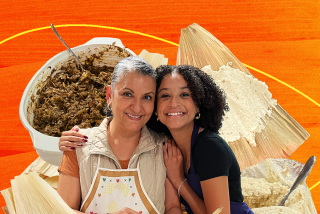New Families Can Be Culturally Confusing
- Share via
Cross-cultural marriages bring amusement as well as challenge.
When Nigerian-born Ayo first met his American in-laws, he behaved as a traditional Yoruba in the presence of elders. In respect, he bowed and kept his upper torso bent low. His concerned new mother-in-law took her daughter aside and asked, “Does he have a back problem?”
Andrea and Grace discovered that they had made a similar “mistake” when preparing food for their newlywed Mexican husbands. After cooking beans, the women had drained them and thrown out the water causing their husbands to lament, “You threw out the caldo!” They had discarded the most nutritious part, the caldo (broth), a flavorful soup base.
When Hiroji took his non-Japanese wife, Beth, to Japan to meet his parents, Hiroji’s mom prepared a bath urging Beth to use it first. When Beth finished, she carefully scrubbed the tub and drained the water to prepare it for the next user. Hiroji’s parents were horrified. Beth was unaware that in Japan, bathers soap and rinse themselves before soaking in the tub then save the same water for the next person.
When Gila was born, her American mother and Iranian father phoned the grandparents in Iran with news of the baby’s firsts: smile, tooth, word, etc. To celebrate each time, the Iranian grandparents slaughtered a sheep and shared the meat with family and friends, but whenever the American grandparents heard about Gila’s development, they would say, “Oh-oh, there goes another sheep.”
More to Read
Sign up for Essential California
The most important California stories and recommendations in your inbox every morning.
You may occasionally receive promotional content from the Los Angeles Times.













